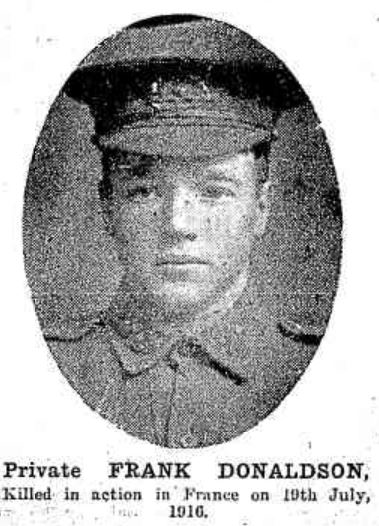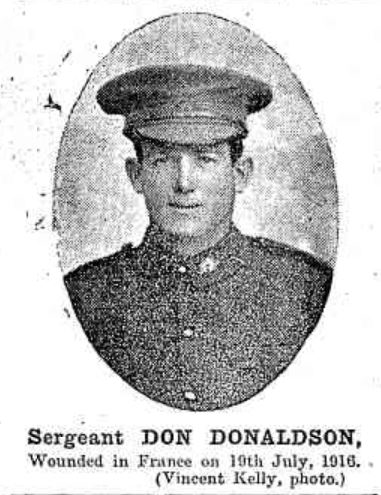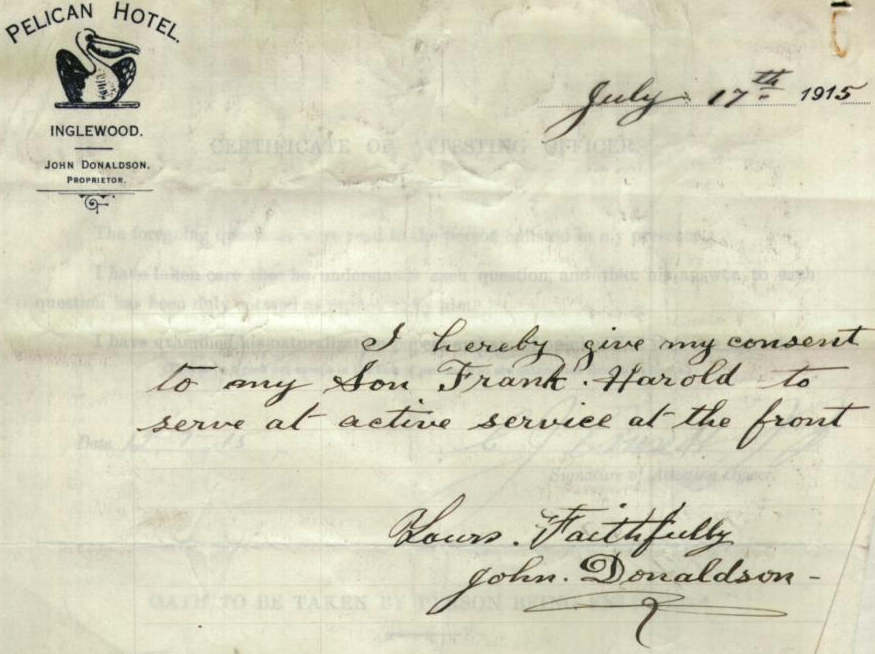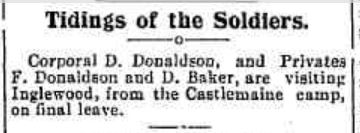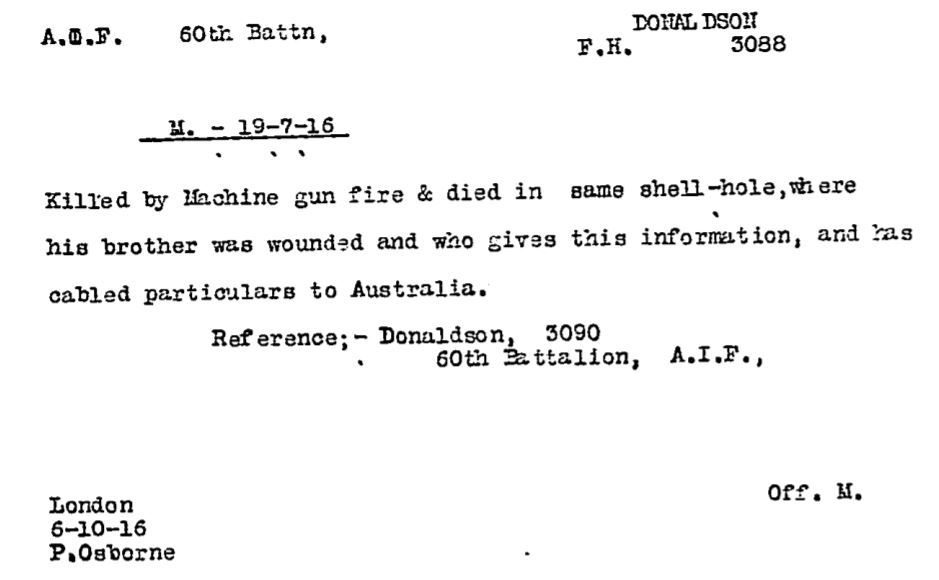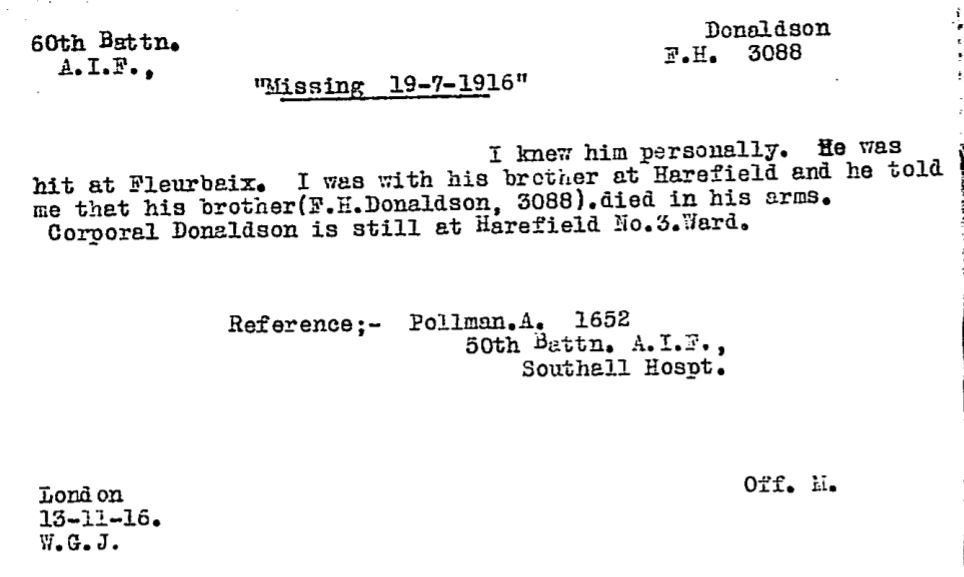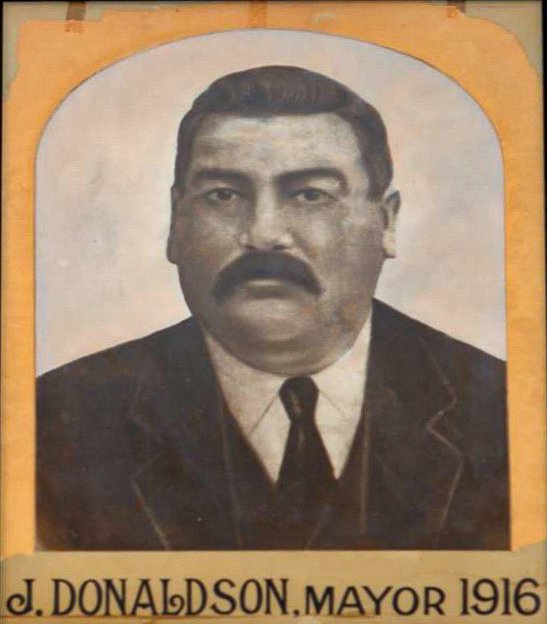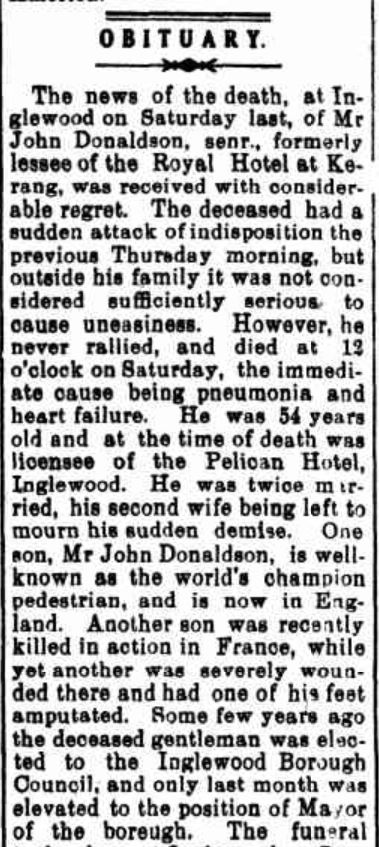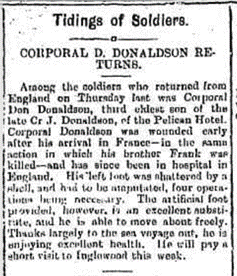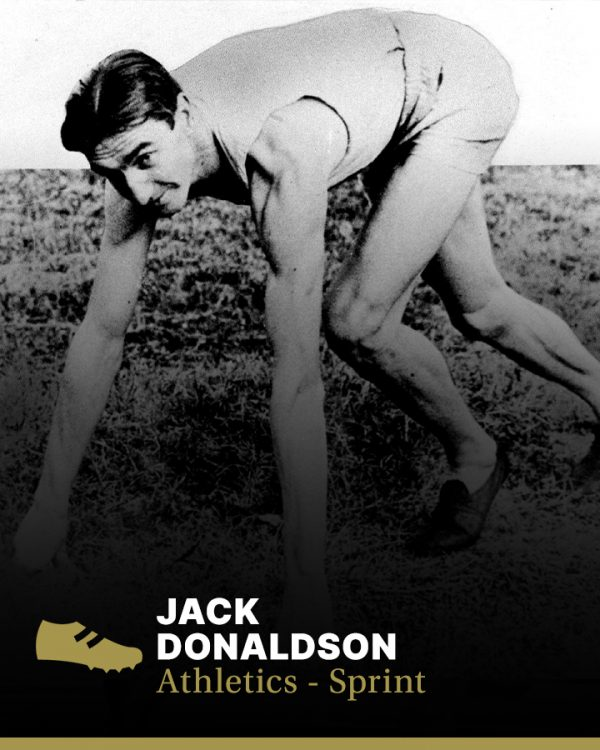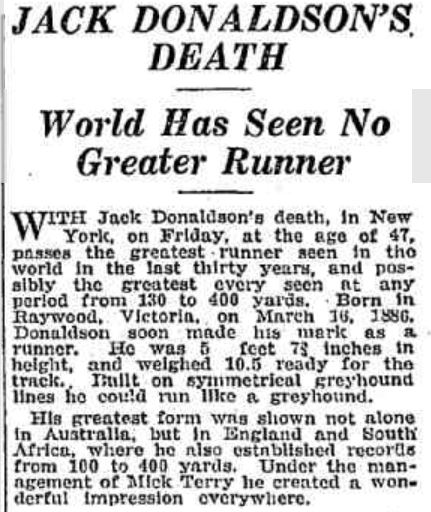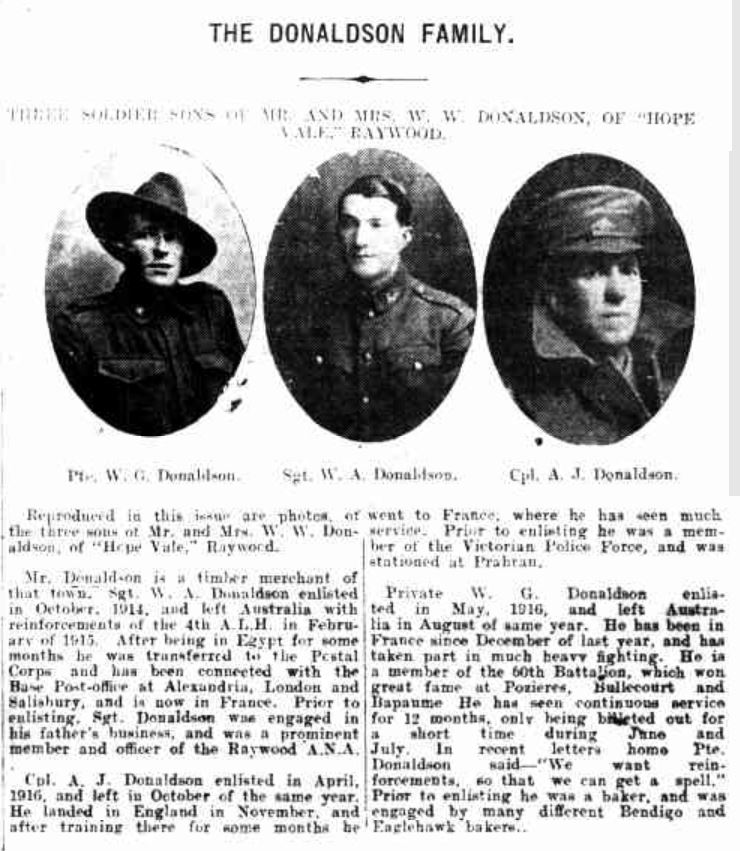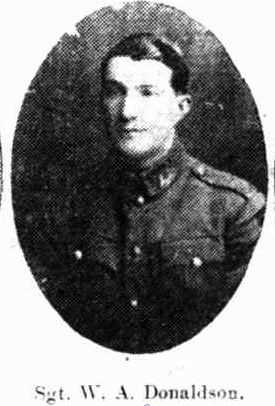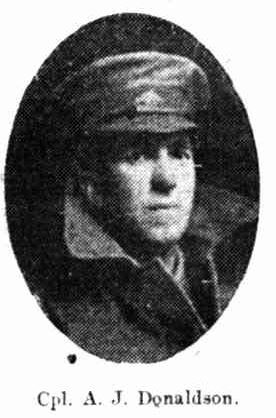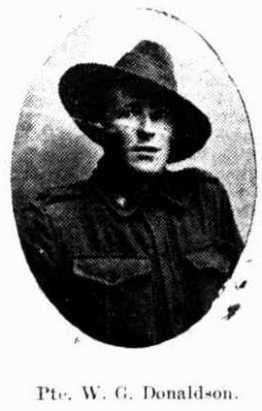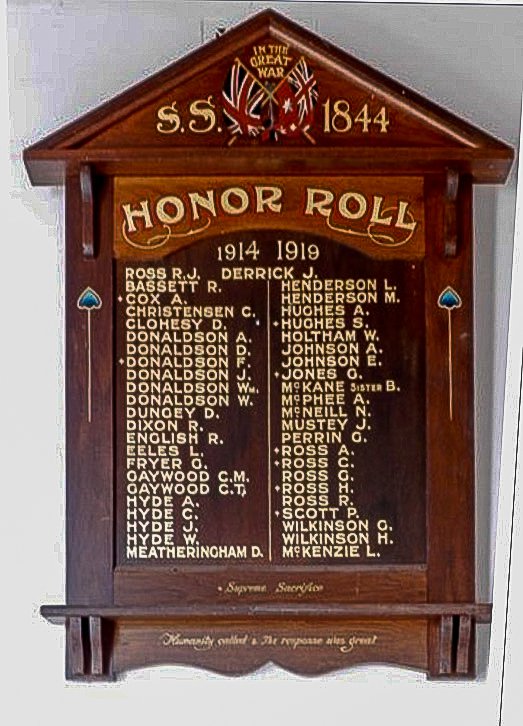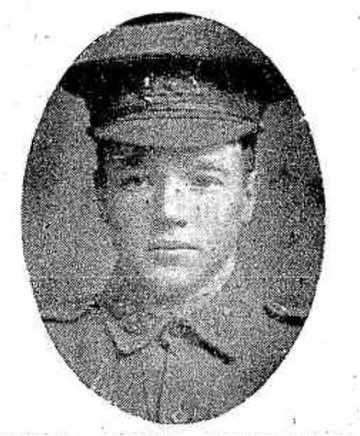
Frank Harold DONALDSON
Eyes brown, Hair light brown, Complexion fair
The Donaldson Families of Raywood and Inglewood
With Thanks to David Rose and The Inglewood Historical Society for their contribution towards writing this story.
The town of Raywood in country Victoria, north of Bendigo had a population of 412 people in 1911 according to census records. It was the birthplace of two Donaldson families, brothers (John and William) and cousins, whose sacrifice and sorrow tell the story of how the war impacted families at the time.
This story focuses particularly on the sons of John Donaldson, Frank Harold “Frank” and Donald David “Don” Donaldson - two brothers who enlisted and fought at the Battle of Fromelles. We also aim to set their story within the context of the broader Donaldson family’s contribution to the war effort and so include the details of the service of Frank and Don’s cousins, the sons of William Donaldson.
John Donaldson (1862-1916), the younger of the two brothers, was a local publican who served as a local councillor and later became Mayor of Inglewood. He married Margaret Smith (1864-1896) in 1885 and had the following children:
- John “Jack” (1886-1933) Service in the British Forces (Manchester 7ths)
- William Richard Donaldson (1888–1972) Exempted from Duty
- Maud Elizabeth Donaldson (1889–1963)
- Donald “Don” David Donaldson (1891–1944) Served in the AIF Reg No 3090A
- Ruby Susan Irene Donaldson (1892–1979)
- Leonard Thomas Donaldson (1894–1894)
- Frank Harold Donaldson (1895–1916) Service in the AIF Reg No 3088, KIA
Tragically Martha died in 1896 at the age of 42 when Frank was just one. In 1899, John remarried Blanche Hale and moved to Kerang but in 1907, John Donaldson became the licensee of the Pelican Hotel, moving his surviving family of 4 sons, 2 daughters and their stepmother to Inglewood.
Twenty-year-old Frank enlisted at Bendigo on 17 July 1915 with his father’s consent and went into camp at Castlemaine to start his training.
Don, aged 24, then enlisted on the 2nd of August and joined his brother in the 21st Battalion. Don’s AIF record shows his rank at times as sergeant, but it is likely that he was acting in the role and it does not appear to have been a permanent promotion.
“He died game” The Story of Frank and Don Donaldson
Frank Harold “Frank” and Donald David “Don” Donaldson - were born in Raywood, just north of Bendigo to John and Margaret Donaldson in the early 1890’s. Their older brother John “Jack” was a world champion sprinter who travelled the world to race and joined the Manchester 7th Regiment.
The brothers sailed for Egypt on 18 November for further training with the embarkation roll showing Frank as a private and Don an acting corporal. In February 1916, the two brothers were transferred to the newly formed 60th Battalion. At this time, Don reverted to the rank of private - but six weeks later, he was promoted to corporal.
On 18 June 1916, they left Egypt from Alexandria enroute to Marseilles, France, where they landed on 29 June. Less than 3 weeks later, they would be in the thick of the action in the Battle of Fromelles as part of the 60th Battalion.
“Warm enough to burn the boots off you”
Writing from Egypt to his father, Cr J. Donaldson, Private Frank Donaldson gave his news:
”The weather at present is very hot—almost warm enough to burn the boots off you. I saw A. E. Roberts, "Ginger" Hughes, "Jos" Deslandes, and George Gook. Hughes has only been back from England a week or so, and he told me that Henry Gook came back to Egypt on the same boat as he did, but I have not met him yet. There are a lot of Inglewood boys about this camp. Harry Stagg is here also, and is in the machine gunners' section. He came up to see me the other night, but I was out and I must look him up this week. They talk about the mallee for flies, but I don't think you could beat this place. Ted Charlton is in my battalion, and is in a tent behind mine. We get cigarettes issued to us, and l can tell you they are enjoyed.”
“What do you think of my luck?”
Don wrote to his family from France:
Jul 14th
Just a few lines from the first line of trenches. Our brigade is at it at last, two battalions in and two in support. We are the supports, and go into the firing line for six hours, doing " fatigue work, and building up trenches where the enemy fire has knocked them about. Another party go at night, also out of our battalion. Our Coys earned a name for themselves the other night. They were carrying rations to boys in the tranches under heavy artillery and Machine, gun fire. The -officers said, "The 60th will do us." Not bad for a "hop off," is it?
All the boys call the Germans "Fritz." I was looking over the trench with a periscope, and "Fritz" fired at it. I signalled him a miss and ducked. To see the boys walking along the trenches you wouldn't think there was a war on. they take no notice of bullets at all, but the shells make a man duck. They were shelling our sap today, but knocked off just before we went to dinner. I see Jim Simpson, Joe Thomas and Jack Simons in the trenches every day; also young Bill Quirk, a Kerang lad. They all look well. I also saw Pat McCarthy and one of the Stanley's. They are in the Miners' Corps. Mac wished to be remembered to you.
I had a letter from Jack the other day. He had a good offer to go to America, but couldn't get a passport. I had stiff luck the other day. I was packed up and ready to go to Paris to represent our battalion at a review with three other men, and word came through at the last moment that no one above the rank of Lance-Corporal was to go. What do you think of my luck ? That would have suited me right down to the ground, Anyhow, the chap who went was out of my platoon, and a very decent fellow. We had to wake him up to tell him. Of course he was pleased, but I was very down in the mouth about it. Old Ted Charleton is a sergeant now and going strong;. He wishes to be remembered to all. Remember me to all.
Don again wrote to his family two days later as they waited in the trenches:
July 16th.
Just a few lines to you all before we go up to the "Advance ! Charge ! " tomorrow We are to take a certain sector of trench and hold it, which I have no doubt we will do. Things are busy along the whole line at present, and we are the first Australian division (general) to make a charge in France. Quite a lot of the boys I came over with have been killed and wounded. Poor Frank Shepherd, of Inglewood, was killed. A shell burst right in his trench, killing him and his mate. These big shells make holes in the ground ap to 10ft deep. They were bursting all round us yesterday, and to day shrapnel is all the go. God knows what it will be to-night, when we are to go out in the charge. One thing, our artillery has been pulverising their trenches a treat for the last 24 hours.
Frank and another chap are to accompany an officer wherever he goes as orderlies in the charge. I have a crook job, carting bombs up to our trench mortars with 20 men, right where all the shells land. But there is always a chance, wherever you are. While we were in the trenches yesterday, we had our gas helmets on twice. It was the English soldiers on our side gassing the Germans. It was a successful attack, we have heard, but the Germans pounded their trenches for their trouble. These Tommies' are fighters! Game as a bulldog. Their wounded had to come down our trench, and the poor beggars were joking with frightful wounds. One poor chap was badly hit in the stomach, and he tried to crack a joke as he passed us. If we get safely through the charge I will write straight away, and let you know how it went.
Little did Don know that the next few days would see the 60th Battalion virtually wiped out. He would be one of the few survivors.
The next news the family were to receive was that Frank had been killed in Action on the 19th July 1916. He was officially reported as missing from 19th July 1916.
Frank had died in his brother’s arms on the 19th July, 1916 at the Battle of Fromelles.
On the 1st of August, 1916, the Inglewood Advertiser wrote:
The receipt of a private cable from England last evening by Cr. J. Donaldson from Sergeant Don Donaldson stirred the town to its depths. Never since the outbreak of war has the public sentiment been more affected. The cable read:
“Poor Frank killed in action; with him to the last.
Wounded in foot; foot amputated; getting on well. – Donaldson.”
Details of Frank’s demise were painfully delivered by his brother, Don, in a subsequent letter to their parents. The letter dated 15 August 1916 was written while Don was being treated at the 2nd Southern General Hospital, Bristol Royal Infirmary – Don had hoped he might be hospitalised near Manchester where his brother, Jack, was stationed but it was not to be. His letter read:
15th August 1916 – “He died game”
The following letter was received on Saturday from Sgt. Don. Donaldson, son of the late Cr, J. and Mrs. Donaldson, "of the Pelican Hotel, and describing the fate which overtook his brother in France.
2nd Southern General Hospital,
Bristol Royal infirmary,
15/8/16.
I know you will be anxiously awaiting this letter, but I have not been feeling up to writing while lying on my back. We were no time in France before we were into the trenches, as you know by my other letters, and when it became known that we had to charge the German trenches on July 16th everybody was in a fever of excitement. Well, they kept postponing the charge until we believed it was all off. Wish to God it had been, but on the 19th, at 6.45pm we had to go over the parapet 400 yards to the German line. We were in the second wave to "hop over," and things were very hot, bullets flying all round us.
We got within 100 yards of the German trench when poor little Frank went down, badly hit in the groin. I ran to help him into a shell-hole close by, when 1 got one through a finger of the left hand — thought my hand was gone. Then, just us I got the poor kid to the hole, he got another through the same place, and one through the arm, and I got it in the foot—blew half my foot right open. I tried to bandage Frank, but our field dressings were not long enough, and I could not make a proper job of it. Then I tied a piece of string around my leg to stop the circulation of the blood, which stopped my foot from bleeding.
Poor little Frank knew he was going, and asked me to say the Lord's Prayer with him, and said, "Poor old Dad" But he was as brave as could be, and when his time had come a few hours later he died game and said good bye to me quite calmly. In fact, he took it a good deal better than I did. I would gladly have changed places with him, for he made me feel a bit of a coward, the calm way he was taking it. So you have something to be proud of Dad, for he died the way you would have any of us die, and he has shown us the way. Anyhow, he has shown me. I never ventured out of the shell-hole that night, as shells were bursting quite close all night. My steel helmet stopped a couple of pieces from getting me in the head. I got back to our trenches next day, dead beat, and the first man to give me a drink and help me to the dressing station was young Jim Treacey, from Kerang. His company did not hop over, as they had been in the trenches a fortnight. The boys entered the German trench nearly along a front of 5000 yards, but the casualties were that heavy they had to retire, so our work went all for nothing—not an inch gained.
But further up the line, at Pozieres and Albert, our boys did great work, two divisions of them, besides English regiments. They had men to follow up. The fact is, they didn't expect the Germans to be so strong after the terrible bombardment. They fairly flattened the German trenches, but they were there with dozens of machine guns, which did the damage. One man in our company came out without a scratch. He was also at. the landing at the Dardanelles. I expect Jack down to see me next week. I tried to get to Manchester, but landed in Bristol. I'm coming along grand now. Remember me to all.
The family were fortunate compared to many other families suffering similar losses in that the Donaldsons had firsthand news of Frank’s death from Don in less than a fortnight. Families often had to wait long periods until military authorities could confirm the fates of their missing sons. In fact, official notifications to the family about Frank’s fate consisted of notification in early September 1916 that he was ‘missing’ and then notification that he had been killed in action was sent in late August 1917 after an official court of enquiry was held – more than 13 months after his death. Receiving news direct from Don must have been heartbreaking but at least they had the comfort of certainty and knowledge of what had happened to their youngest boy.
15h August 1916 – “A fine worthy son”
In Tribute to a Soldier.
THE LATE PTE. F. DONALDSON.
Prior to the commencement of the business at Friday evening's meeting of the Borough Council, Cr Horan referred to the severe loss Cr J. Donaldson had recently sustained in the deeply regretted loss of his son, Pte F. Donaldson, and moved that a letter of condolence be for warded him. Private Donaldson had been a fine, worthy son, and well known to all - The loss was an irreparable one but was one of those which had to be borne, as hundreds of others would have to be borne before the end of the atrocious war. The soldier had ben of fine character and unselfish in the extreme. He had been good to his parents, his family and himself, and to his God and his country,' :lf spared, he would have made a fine family man and been an asset to his country. The maiming of Sergeant Donaldson had been a calamity, but the loss of Frank could not be replaced in anyway.; They, could assure Cr and Mrs Donaldson their most sincere sympathy but were proud that since the loss had come it had been incurred in guarding the rights and privileges of the world. Though they could not recall those who had gone, they could recall their memory and respect and venerate it, (Hear, hear.)
Cr Ham Seconded, / Pte Donaldson had been a valued citizen and a promising man, and if he had lived to return from the war would have been an asset to the borough. ' He had been faithful to his parents and his country and had fallen fighting for the little town of Inglewood and his King. His had been a noble death. (Hear, hear.) The motion was then put and carried.
John Donaldson Senior Dies
Just two months after 21-year-old Frank’s death, his father John, fell ill and died on 23 September 1916 aged 54 years.
John had been licensee of the Pelican Hotel in Inglewood and was also a popular local councilman. He had been elected Mayor just a month before his death when the incumbent mayor enlisted in the AIF.
At the same time, he was dealing with the death of his youngest son, enlistment troubles for his eldest and the severe wounding of another son – all three sons being far from home on the other side of the world.
The English newspaper, Manchester’s “Sporting Chronicle”, also paid tribute by offering sincere sympathies to “the famous Australian runner, Jack Donaldson” on the death of his brother, Frank, and the wounding of Don. Jack wrote to his parents and included a clipping of the article which read:
Jack" Donaldson. the champion pedestrian, in a touching letter to his parents, the late Cr J. and Mrs Donaldson, on the occasion of his Brother’s death in France, encloses the following clipping, published in the Manchester "Sporting Chronicle"
“I deeply regret to learn that the famous Australian runner, Jack Donaldson, has suffered a great bereavement by the death of a brother, who has been killed in the fighting in France. Another brother has had the misfortune to lose a foot. One of these brave soldiers gave great promise as an athlete, and I know that the champion had great hopes of him following in his footsteps. Between him and his brothers the deepest affection existed, and these tragic happenings have come to him as a great calamity. Every lover or foot racing, and none more sincerely than myself, will extend their sympathy to the 'Blue Streak.' The champion also intimated that he was to run 100 yards and 200 yards' matches with Applegarth, the English crack. The King and Queen, and many other prominent personages, were to attend.”
Don returns to Australia
The Battle of Fromelles was the first and last action in which Don was involved. His left foot and lower leg required amputation, and he remained in an English hospital until he was finally able to return to Inglewood in January 1918
After his return, Don moved to Melbourne where he worked initially as a barman and as a caretaker. He married Violet Marriott in 1924 and they welcomed their son in 1930.
Don passed away aged 53 in 1944 at the Repatriation Hospital, Caulfield and was cremated at Springvale Cemetery.
Jack was the eldest of the Donaldson children and was a professional sprinter - or “pedestrian” in the terminology of the era. He was known as “The Blue Streak” – partly for his speed and also for the light blue singlet emblazoned with a white A that he wore on the track.
Aged 20, Jack narrowly lost the Stawell Gift in 1906 with a handicap of 11 yards but later went on to hold at least six world records across his career, running in Australia, South Africa, England and America. His 1910 100-yard record (9.375 seconds) set in Johannesburg stood until 1948 while his 130-yard record (12 seconds) set in Sydney in 1911 stood until 1951. He was clearly a gifted and natural athlete.
During the war, Jack was based in England as a professional runner and was ordered by the courts to join the war effort. He enlisted with the 7th Battalion of the Manchester Regiment and took part in the Battles of Arras in France in April-May 1917.
In 1919, he moved to America where he married and had two daughters, Phyllis and Joan. Tragically he died in New York in 1933 at the age of 47 and is buried in Galilee, Pennsylvania. A memorial was erected in his honour in Central Park in Stawell in 1939.
Donaldson cousins who also served
William Walter Donaldson (1856-1940) was a timber merchant and the older brother of John Snr. Both brothers lived in Raywood. William, born in Scotland, had immigrated to Australia in 1857 as a one-year-old with his family while John senior was one of five children born in Victoria where the family settled.
William married Margaret Johnson (1864-1942) in 1885 and they had nine children, the three eldest of whom served in WW1:
- William Andrew Donaldson (1886–1965) Served in the AIF, Reg No 711
- Arthur John Donaldson (1888–1960) Served in the AIF, Reg No 5819
- Walter George Donaldson (1890–1919) Served in the AIF, Reg No 2145
- Edwin Slater Donaldson (1892–1893}
- Mary Adelaide Donaldson (1894–1967)
- Isabel May Donaldson (1896–1956)
- Herbert Thomas Donaldson (1900–1978)
- Margaret Milne Donaldson (1904–1989)
- Leslie James Donaldson (1906–1981)
Sergeant William Andrew Donaldson
- Son of Walter and Margaret
- Reg No 711
- Units Australian Army Postal Corps and 4th Light Horse Regiment, 2nd Reinforcement
- Enlisted: 26 Oct 1915
- Returned to Australia 27 May 1919
- Died in 1940 Raywood, Vic
Corporal Arthur John Donaldson
- Son of William and Margaret
- Reg No 5819
- Units 21st Battalion, 16th Reinforcement, 24th Battalion
- Enlisted on 11 Apr 1916
- Returned to Australia on 8 May 1919
- Died in 1960, Repatriation Hospital, Heidelberg
Private Walter George Donaldson
- Son of William and Margaret
- Unit 60th Battalion, 4th Reinforcements
- Reg No 2145
- Enlisted on 3 May 1916
- Returned to Australia on 30 Jan 1918 (Wounded)
- Died in 1919 Base Hospital, Melbourne
The Search Continues for Frank
For many families, details of their missing one’s fate took years to establish, and still to this day, the location of Franks final resting place is unknown.
All six cousins are remembered on the Raywood State School Honor Roll with the names of the Donaldsons who served - Arthur, Don, Frank, Jack, William and Walter. Frank, Don and Walter were all part of the 60th Battalion.
Frank and Don Donaldson are also commemorated on the Inglewood War Memorial and, as he has no known grave, Frank’s name is listed at V.C. Corner (panel 20) of the Australian Cemetery and Memorial at Fromelles in France.
In the hope of locating Frank’s final resting place, we continue our search using historical and genealogical research, including DNA. While both a Y and a Mt donor have been located, additional DNA donations are still being sought from Frank’s family. Any support or information provided will be most welcome. Please contact us.
DNA (both mitochondrial and Y DNA) are still being sought for family connections to
| Soldier | Frank Harold DONALDSON 1895-1916 |
| Parents | John DONALDSON 1862-1916, Victoria and Margaret Martha SMITH 1864-1896, Victoria |
| Grandparents | |||
| Paternal | William Balfour DONALDSON b. 1818, Scotland d. Raywood, Victoria and Barbara MILNE b. c1830, Scotland d. 1903, Victoria | ||
| Maternal | William SMITH b. c1825 ? d. 1897, Victoria and Susan THULBOURN b. c1835 England d. 1923, Victoria |
The Fromelles Association would love to hear from you

Contacts
(Contact: carla@fromelles.info or geoffrey@fromelles.info).
(Contact: army.uwc@defence.gov.au or phone 1800 019 090).
Donations
If you are able, please contribute to the upkeep of this resource.
(Contact: bill@fromelles.info ).
